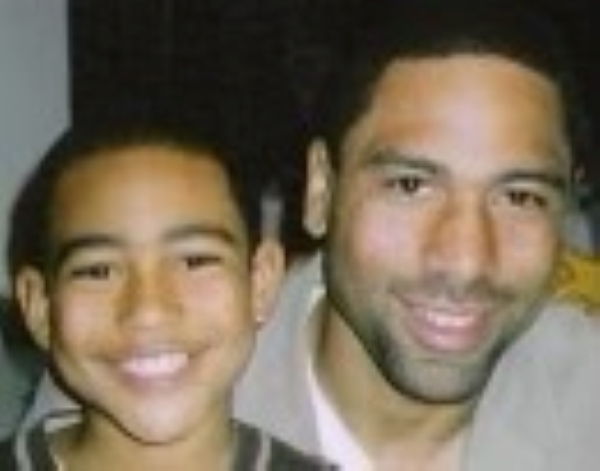With Father’s Day approaching, let’s talk about ‘Quarterback Dads’
If you’re a dad, then Sunday is your day.
If you’re a Quarterback Dad, every day is your day.
Every day is your day to produce the next Tom Brady or C.J. Stroud or Arch Manning or some sixth-grader out there who’s The Next Big Arm.
“Quarterback Dads” have become a thing, the testosterone version of a “Stage Mom.” The latter has been around forever (the play “Gypsy,” anyone?), while the former is a relatively recent phenomenon. The concept is the same. At one end of the parenting spectrum are those moms and dads who guide and protect their children. At the other are those parents who try to reach their dreams via the vehicle of their child’s talent.
In “Quarterback Dads: Wild Tales from the Field,” former Chicago Tribune sportswriter Teddy Greenstein and private quarterback coach Donovan Dooley study the genus Quatra Retro Pater, from the dads who stay in the background to the dads blinded by the spotlight of success. Greenstein, now a senior editor at PointsBet, and Dooley list 15 prototypes of a Quarterback Dad. Twelve are, in their diplomatic word, “problematic.” That’s 80 percent, for those of you keeping stats on the sideline, a trait you share with one Quarterback Dad prototype.
Craig Young is the dad of the best quarterback in college football, Alabama junior Bryce Young. Craig defined quarterback dads (in lowercase) as “the informal fraternity of fathers who are fully invested in helping their sons navigate all that comes with playing the position of quarterback.”
That sounds harmless and, in fact, beneficial. The way that Young practices fatherhood, it is both. He is aware that isn’t the case with every Quarterback Dad.
“I think when you hear the phrase, your initial thought is that it is an insult or that it is pejorative,” Young said via text.
He then listed the adjectives attached to Quarterback Dads: “over-involved, meddlesome, controlling, selfish, unrealistic, crazy!! But I don’t think you have to be any of those things to be an effective QB dad. (What) you need to be is present, supportive, protective, honest, accommodating and thick-skinned!! QB is unlike any position in sport and it demands so much from the player and his family.”
There are Quarterback Dads who are icons for handling their sons the correct way. Archie Manning never confused his ego with the achievements of sons Peyton and Eli. There are Quarterback Dad icons at the other end, too. Marv Marinovich tried to control so many external factors in son Todd’s life that Todd nearly destroyed himself in rebellion.
In the book, the authors describe how Dooley asked parents to leave, then handed his quarterback students 3×5 cards and asked them to write messages to their fathers. Here are a few choice ones.
“I’m not starting because of you and you know it.”
“You never played and you still tell me every damn day how to improve.”
“I wish I could tell you I wanna quit. My arm kills.”
Quarterback Dads don’t start out to be destructive. It’s just that their motivation may not line up with that of their sons. It may not line up with reality, either. The problematic Quarterback Dads, Greenstein and Dooley write, don’t see themselves as the issue. It’s someone else – the head coach, the playcaller, the teammates or the son himself.

Quarterback Dads hover. They speak of their son’s achievement in third person plural. They are quick to promote their son and tear down the play of others. The book “Quarterback Dads” is a study of the human psyche unbound, and there are a lot more Goofuses than there are Gallants.
Craig Young has a master’s degree in counseling, and even he started out down the wrong trail. In an earlier interview, he said that as a young quarterback, Bryce didn’t do well at crunch time.
“A lot of that, honestly, was my fault because I was his coach,” Craig said. “I was putting so much pressure on him. I was making all those same mistakes that coaching dads do, coaching him harder. It goes two ways: Either coaching dad is too permissive and you design everything for him, you design to make him the star, or you overcoach him because you don’t want people to think you’re showing favoritism. Neither one is fair. I did the latter, so I think that had a lot to do with it.”
Julie Young saw what her husband was doing and called him to account. Craig said his wife asked him, “Do you want your relationship with your son to be altered because of how you’re acting? Do you want this to come between you guys?”
He realized that what he saw as tough love is not what Bryce responded to, no matter how well-intentioned it might be. Craig made the relationship more positive, more collaborative. And he made sure Bryce knew the difference between quarterback and celebrity.
“Fall in love with the process and fall in love with football,” Craig said. “Don’t fall in love with the trappings of football – the attention, the treatment that you get. Understanding all of that is conditional and contingent upon how you perform and how you make people feel. Your value and your confidence needs to come from within.”
Quarterback Dads will proliferate as long as there are scholarships to be had and, now, NIL deals to be signed, as long as fathers live vicariously through their sons. Craig Young would be the first to tell you that being a productive Quarterback Dad isn’t easy. If he makes it look easy, it’s because so many others make it look so hard.